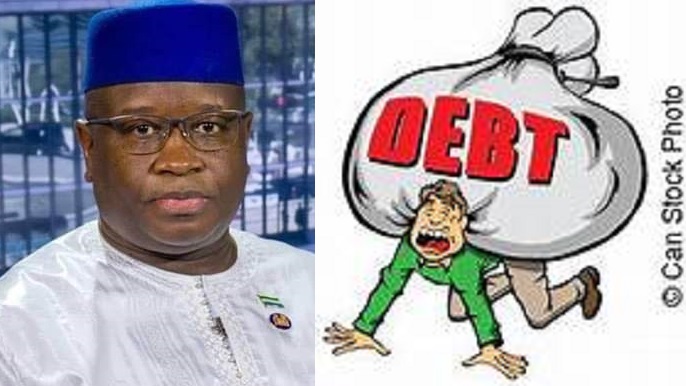The country’s debt service payments continue to weaken the domestic revenue as debt service payments, including amortization, accounted for 37 percent of domestic revenue and 20 percent of total expenditures at the end of June 2022.
Reflecting the increase in financing, needs in Sierra Leone, the public debt stock reached NLe40.3 billion (US$3.0 billion) by the end of June 2022, representing 79.8 percent of GDP, according to the Minister of Finance, Dennis K. Vandi.
In his 2023 Budget Speech read in Parliament last Friday, external debt is estimated at $1.9 billion and domestic debt at NLe 14.5 Billion. He told Parliament that total interest payments are projected at NLe2.5 Billion(3.7 percent of GDP) for 2023.
Interest payments on the domestic debt will account for NLe2.2 billion and NLe220.9 million on foreign debt.
Highlighting the ministry’s Debt Management Policy, the minister told parliament that the high level of debt service payment has been one of the greatest challenges in management in recent years.
Therefore, to ensure the sustainability of public debt and improve its transparency, Minister Vandi Government’s strategy for stabilizing the economy.
He attributed the build-up in public debt in recent years to certain factors which he says are the wider weakening in the macroeconomic fundamentals, including the contraction in GDP, drop in domestic revenues, and fall in exports triggered by the twin shocks of the Ebola epidemic and the collapse in iron ore prices in 2015, and recently the COVID-19 pandemic and the Ukraine crisis.
The disbursement of emergency support loans by development partners to complement Government resources in mitigating the impact of COVID-19 on the population loan disbursements by development partners to support the implementation of projects in various sectors, including roads, electricity, agriculture, education, and health and the inclusion of the verified stock of domestic contractors’ arrears of about US$360.0 million inherited by the Government in 2018.
To ensure debt sustainability, Government he says will limit domestic borrowing within a sustainable fiscal anchor; continue to seek grant financing or borrow concessional loans to finance investments in key sectors of the economy, especially infrastructure, and continue to introduce local medium to long-term bonds for the financing of infrastructure projects.
Additionally that they will also continue to explore non-debt-creating financing models such as Public-private Partnerships (PPPs) supported by thorough analyses of the potential fiscal risks, implement the updated Arrears Clearance Strategy; annually update and implement the Medium-term Debt Strategy to guide public debt management and continue to strengthen debt management and improve debt reporting and transparency through the regular publication of publicly guaranteed debt.



 Post a comment
Post a comment









Comment(s)
Disclaimer: Comments expressed here do not reflect the opinions of Sierraloaded or any employee thereof.
Be the first to comment